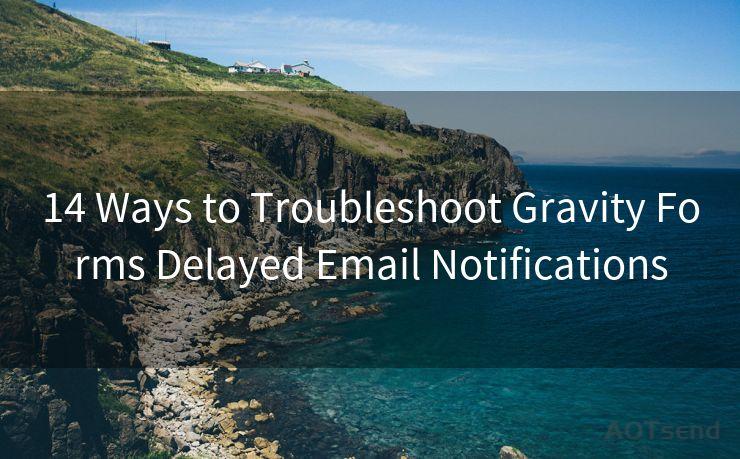14 Ways to Troubleshoot Gravity Forms Delayed Email Notifications




Gravity Forms is a powerful WordPress plugin that allows users to create advanced forms for their websites. However, sometimes users may encounter issues with delayed email notifications. In this article, we'll explore 14 ways to troubleshoot Gravity Forms delayed email notifications.
1. Check Email Settings
First and foremost, ensure that your email settings are configured correctly. Verify the SMTP settings, including the host, port, username, password, and encryption type. Incorrect settings can cause delays or failures in sending emails.
2. Test Email Connectivity
Use tools like Telnet or online SMTP testers to check the connectivity of your email server. This helps identify any potential issues with the server itself.
3. Check Server Resources
High server load or insufficient resources can cause delays in email notifications. Monitor your server's CPU, memory, and disk usage to ensure they are within acceptable limits.

4. Examine Email Logs
Review your server's email logs for any error messages or warnings. These logs can provide valuable insights into what might be causing the delays.
5. Update Gravity Forms and WordPress
Ensure that both Gravity Forms and WordPress are up to date. Outdated software can sometimes cause compatibility issues that affect email notifications.
6. Disable Other Plugins
Sometimes, other WordPress plugins can conflict with Gravity Forms, causing email delays. Try disabling other plugins temporarily to see if it resolves the issue.
7. Check Email Content
Large email attachments or complex HTML content can slow down the sending process. Simplify your email templates and reduce file sizes to improve delivery speed.
8. Contact Your Host Provider
If you've checked all the above and still face delays, it might be worth contacting your hosting provider. They may have additional insights or tools to help diagnose the problem.
9. Use a Dedicated Email Service
Consider using a dedicated email service like SendGrid or Mailgun for more reliable and faster email delivery. These services are optimized for sending emails and can often bypass common delivery issues.
10. Monitor Email Delivery Rates
Keep track of your email delivery rates using tools like Google Analytics or other email tracking software. This data can help you identify patterns or trends that might indicate a larger issue.
11. Check DNS Settings
Ensure that your domain's DNS settings are correct and that there are no issues with DNS propagation. Incorrect DNS settings can affect email delivery.
🔔🔔🔔
【AOTsend Email API】:AOTsend is a Managed Email Service for sending transactional emails. Support Email Types: reminders, authentication, confirmations, notifications, verification codes, invoices, password resets, account activations, billing statements, two-factor authentication (2FA), and one-time passwords (OTP) emails, etc. $0.28 per 1000 Emails. 99% Delivery, 98% Inbox Rate.
You might be interested in:
Why did we start the AOTsend project, Brand Story?
What is a Managed Email API, How it Works?
Best 25+ Email Marketing Platforms (Authority,Keywords&Traffic Comparison)
Best 24+ Email Marketing Service (Price, Pros&Cons Comparison)
Email APIs vs SMTP: How they Works, Any Difference?
12. Review Spam Filters
Sometimes, email notifications might be getting caught by spam filters. Review your spam filter settings and consider adding whitelist rules for Gravity Forms emails.
13. Optimize Database Performance
A slow or bloated database can affect the performance of Gravity Forms and, consequently, email notifications. Regularly optimize your database to ensure optimal performance.
14. Seek Professional Help
If none of the above solutions work, consider seeking professional help from a WordPress or Gravity Forms expert. They can provide more targeted solutions based on your specific setup and configuration.
In conclusion, troubleshooting Gravity Forms delayed email notifications can be a complex process. However, by following these 14 tips, you should be able to identify and resolve most issues. Remember to always backup your site before making any significant changes, and don't hesitate to seek professional assistance if needed.




Scan the QR code to access on your mobile device.
Copyright notice: This article is published by AotSend. Reproduction requires attribution.
Article Link:https://www.mailwot.com/p2313.html



